ACT I
There is wind of war in Memphis. Ramfis, the High Priest and secret power of the State, informs Radames, captain of the guards, that the Ethiopians are about to invade Egypt. The idea of a war stimulates Radames, a man of ambition and courage. He hopes the god Isis will appoint him supreme commander of the army. He dreams of glory, and everything seems possible. War, for him, is also an occasion to appear valiant before the eyes of the woman he secretly loves: Aida, an Ethiopian slave in the service of Amneris, the Pharaoh’s daughter.
The Egyptian princess is also in love with Radames. Intuitive by nature, though, she immediately suspects she has a rival in this slave but prefers to conceal her jealousy with double cunning. Meanwhile, Aida’s heart is heavy with anxiety: her country is at war, yet at the same time, a love links her to a new world.
A fanfare sounds and a majestic choral scene overrides individual conflicts and aspirations. The leaders of the State meet to plan a war strategy. The King and Ramfis stand out as personalities who have no individual identity, personifying a power which crushes anyone who stands in their way.
After a messenger arrives to confirm that the Ethiopians have invaded under the leadership of King Amonasro, the Pharaoh announces that the Oracle has chosen Radames to be commander-in-chief.
Everyone is thrilled and urges him to return home victorious. Aida, in private, grieves: she hopes Radames will be victorious but at the same time, wants her father, Amonasro to destroy the Egyptian troops. Desperate, full of repressed anxiety, she prays to the gods for mercy.
The rite of investiture as commander-in-chief takes place in the Temple of Vulcan. Against a background of singing and dancing, a silver veil is placed on Radames’s head while Ramfis hands him the consecrated sword. The commander-in-chief has received a blessing, hence it is a just war albeit set on destruction.
ACT II
Amneris is in her apartment preparing for Radames’s triumphant return. Her double-cross with Aida proceeds astutely. She is friendly to her but leads their conversation to the issue most dear to her, putting the slave’s feelings to the test: Radames, she informs her with studied indifference, has been killed in battle. Aida’s desperation at hearing this news now confirms Amneris’s suspicions. She reveals the deception and admits the truth: Radames is alive, but she, too, is in love with him. Furious, the Pharaoh’s daughter threatens revenge.
In Scene 2 private fates are forgotten as marches, dances, hymns and fanfares welcome the victorious army at Thebes. Radames enters at the end of the triumphal procession. The King promises to grant all Radames’s wishes. The Ethiopian prisoners file past, too and Aida recognizes one of them, her father Amonasro dressed as a simple officer who speaks on behalf of all the hostages, asking for clemency. Ramfis invites the King to show no pity while Radames requests that the prisoners be granted life and freedom. The King reaches a compromise: Aida and Amonasro will remain hostages in Egypt as guarantors of peace, all the others will be released. The marriage of Amneris to the triumphant Radames is announced. In an atmosphere of general repudiation, Amonasro meditates revenge. Aida and Radames are desperate. With private sentiments and great collective emotions manipulated and organized according to a fanatical ritual, any kind of conciliation is impossible.
ACT III
At night, on the banks of the Nile, Amneris goes into the temple of Isis to pray. It is the eve of her wedding. Aida also arrives, secretly: she has an appointment with Radames. Filled with anxiety and nostalgia, Aida evokes the wide open spaces of her homeland, sings her love for her lost country, symbol of a promised happiness that has vanished.
Amonasro appears unexpectedly, and organizes an ambush against the Egyptian army. He has realised that Aida and Radames are linked and he takes advantage of his daughter’s feelings to work out a strategy. With deceptive sweetness, he promises her return home, glory and love but he poses a condition: her loved one must divulge the route of the Egyptian troops. Aida tries to oppose this but her father’s curse and her sense of guilt should her people be massacred lead her to giving in. Plagiarised, Aida faces the meeting with her loved one, explaining the reasons for which the only solution possible is her escape. She manages to convince him, using seduction and sensuality. Radames reveals the military plans she wants but Amonasro, inopportunely, appears and reveals
his identity, frustrating everyone.
The situation worsens. Amneris, who has overheard the conversation, comes out of the temple, crying of betrayal. Amonasro hurls himself at her to kill her, but Radames blocks him, hands over his sword to Ramfis and has himself arrested. Aida flees with her father. Her dream of love is now shattered forever, on the banks of the Nile.
ACT IV
In a room of the King’s palace, Amneris is now in despair. Her pride hurt, she is torn between
anger and love, between her wish to save Radames or to ruin him. In the end she decides to save him. She has him brought before her and begs him to prove his innocence: she will ask the King for mercy.
Radames refuses, claiming he has betrayed unintentionally and, having lost Aida, says he would prefer to die. He resists Amneris’s flattery, even when she reveals that Aida is still alive and she promises to save him if he renounces his love for the slave girl.
Radames is taken back to prison. The priests come to give their verdict. Ramfis’s accusations can be heard in the distance, in contrast with the silence of the accused followed by the diatribe of the holy ministers. The sentence arrives quickly: Radames is guilty and will be buried alive. Amneris seeks to save him, but her intervention is of no use in the light of the cruelty of the priests, the real bearers of power. Not even the Pharaoh’s daughter can oppose the repressive apparatus of the State, the implacable mechanisms of military and religious organisation.
In the Temple of Vulcan, the priests bury Radames under a tombstone. Aida, however, is already hiding there, having entered the crypt secretly, to die alongside her beloved. He is desperate; she sees the angel of death approaching and with it, eternal joy. The temple is now invaded by light
and a defeated Amneris prays for peace. A single, sinister note sounds repeatedly. In the obscure underground where they are buried, Aida and Radames are immersed in a sea of musical light, heralding another world beyond this where they will enjoy the happiness that has been denied them on Earth.
Backstory: The Egyptians have captured and enslaved Aida, an Ethiopian princess. An Egyptian military commander, Radamès, struggles to choose between his love for her and his loyalty to the King of Egypt. To complicate the story further, the King's daughter Amneris is in love with Radamès, although he does not return her feelings.
Act 1
Scene 1: A hall in the King's palace; through the rear gate the pyramids and temples of Memphis are visible
Ramfis, the high priest of Egypt, tells Radamès, the young warrior, that war with the Ethiopians seems inevitable, and Radamès hopes that he will be chosen as the Egyptian commander (Ramfis, Radamès: "Sì, corre voce l'Etiope ardisca" / Yes, it is rumored that Ethiopia dares once again to threaten our power).
Radamès dreams both of gaining victory on the battlefield and of Aida, an Ethiopian slave, with whom he is secretly in love (Radamès: "Se quel guerrier io fossi! ... Celeste Aida" / Heavenly Aida). Aida, who is also secretly in love with Radamès, is the captured daughter of the Ethiopian King Amonasro, but her Egyptian captors are unaware of her true identity. Her father has invaded Egypt to deliver her from servitude.
Amneris, the daughter of the Egyptian King, enters the hall. She too loves Radamès, but fears that his heart belongs to someone else (Radamès, Amneris: "Quale insolita gioia nel tuo sguardo" / In your looks I trace a joy unwonted).
Aida appears and, when Radamès sees her, Amneris notices that he looks disturbed. She suspects that Aida could be her rival, but is able to hide her jealousy and approach Aida (Amneris, Aida, Radamès: "Vieni, o diletta, appressati" / Come, O delight, come closer).
The King enters, along with the High Priest, Ramfis, and the whole palace court. A messenger announces that the Ethiopians, led by King Amonasro, are marching towards Thebes. The King declares war and proclaims that Radamès is the man chosen by the goddess Isis to be the leader of the army (The King, Messenger, Radamès, Aida, Amneris, Ramfis, chorus: "Alta cagion v'aduna .. Guerra, guerra, guerra!" / Oh fate o'er Egypt looming .. War, war, war!). Upon receiving this mandate from the King, Radamès proceeds to the temple of Vulcan to take up the sacred arms (The King, Radamès, Aida, Amneris, chorus: "Su! del Nilo al sacro lido" .. (reprise) "Guerra, guerra guerra!" / On! Of Nilus' sacred river, guard the shores .. (reprise) War, war, war!).
Alone in the hall, Aida feels torn between her love for her father, her country, and Radamès (Aida: "Ritorna vincitor" / Return a conqueror).
Scene 2: Inside the Temple of Vulcan
Solemn ceremonies and dances by the priestesses take place (High Priestess, chorus, Radamès: "Possente Ftha ... Tu che dal nulla" / O mighty Ptah). This is followed by the installation of Radamès to the office of commander-in-chief (High Priestess, chorus, Ramfis, Radamès: "Immenso Ftha .. Mortal, diletto ai Numi" / O mighty one, guard and protect!). All present in the temple pray fervently for the victory of Egypt and protection for their warriors ("Nume, custode e vindice"/ Hear us, O guardian deity).
Act 2
Scene 1: The chamber of Amneris
Dances and music to celebrate Radamès' victory take place (Chorus, Amneris: "Chi mai fra gli inni e i plausi" / Our songs his glory praising). However, Amneris is still in doubt about Radamès' love and wonders whether Aida is in love with him. She tries to forget her doubt, entertaining her worried heart with the dance of Moorish slaves (Chorus, Amneris: "Vieni: sul crin ti piovano" / Come bind your flowing tresses).
When Aida enters the chamber, Amneris asks everyone to leave. By falsely telling Aida that Radamès has died in the battle, she tricks her into professing her love for him. In grief, and shocked by the news, Aida confesses that her heart belongs to Radamès eternally (Amneris, Aida: "Fu la sorte dell'armi a' tuoi funesta" / The battle's outcome was cruel for your people).
This confession fires Amneris with rage, and she plans on taking revenge on Aida. Ignoring Aida's pleadings (Amneris, Aida, chorus: "Su! del Nilo al sacro lido" / Up! at the sacred shores of the Nile), Amneris leaves her alone in the chamber.
Scene 2: The grand gate of the city of Thebes
Radamès returns victorious and the troops march into the city (Chorus, Ramfis: "Gloria all'Egitto, ad Iside" / Glory to Egypt, to Isis!).
The Egyptian king decrees that on this day the triumphant Radamès may have anything he wishes. The Ethiopian captives are led onstage in chains, Amonasro among them. Aida immediately rushes to her father, who whispers to her to conceal his true identity as King of Ethiopia from the Egyptians. Amonasro deceptively proclaims to the Egyptians that the Ethiopian king (referring to himself) has been slain in battle. Aida, Amonasro, and the captured Ethiopians plead with the Egyptian King for mercy, but Ramfis and the Egyptian priests call for their death (Aida, Amneris, Radamès, The King, Amonasro, chorus: "Che veggo! .. Egli? .. Mio padre! .. Anch'io pugnai .. Struggi, o Re, queste ciurme feroci" / What do I see?.. Is it he? My father? .. Destroy, O King, these ferocious creatures).
Claiming the reward promised by the King of Egypt, Radamès pleads with him to spare the lives of the prisoners and to set them free. The King grants Radamès' wish, and declares that he (Radamès) will be his (the King's) successor and will marry the King's daughter (Amneris). (Aida, Amneris, Radamès, Ramfis, The King, Amonasro, chorus: "O Re: pei sacri Numi! .. Gloria all'Egitto" / O King, by the sacred gods ... Glory to Egypt!). At Ramfis' suggestion to the King, Aida and Amonasro remain as hostages to ensure that the Ethiopians do not avenge their defeat.
Act 3
On the banks of the Nile, near the Temple of Isis
Prayers are said (Chorus, High Priestess, Ramfis, Amneris: "O tu che sei d'Osiride" / O thou who to Osiris art) on the eve of Amneris and Radamès' wedding in the Temple of Isis. Outside, Aida waits to meet with Radamès as they had planned (Aida: "Qui Radamès verra .. O patria mia" / Oh, my dear country!).
Amonasro appears and orders Aida to find out the location of the Egyptian army from Radamès. Aida, torn between her love for Radamès and her loyalty to her native land and to her father, reluctantly agrees. (Aida, Amonasro: "Ciel, mio padre! .. Rivedrai le foreste imbalsamate" / Once again shalt thou gaze). When Radamès arrives, Amonasro hides behind a rock and listens to their conversation.
Radamès affirms that he will marry Aida ("Pur ti riveggo, mia dolce Aida .. Nel fiero anelito"; "Fuggiam gli ardori inospiti .. Là, tra foreste vergini" / I see you again, my sweet Aida!), and Aida convinces him to flee to the desert with her.
In order to make their escape easier, Radamès proposes that they use a safe route without any fear of discovery and reveals the location where his army has chosen to attack. Upon hearing this, Amonasro comes out of hiding and reveals his identity. Radamès realizes, to his extreme dismay, that he has unwittingly revealed a crucial military secret to the enemy. At the same time, Amneris and Ramfis leave the temple and, seeing Radamès in conference with the enemy, call for the imperial guards. Amonasro draws a dagger, intending to kill Amneris and Ramfis before the guards can hear them, but Radamès disarms him, quickly orders him to flee with Aida, and surrenders himself to the imperial guards as Aida and Amonasro run off. The guards arrest him as a traitor.
Act 4
Scene 1: A hall in the Temple of Justice. To one side is the door leading to Radamès' prison cell
Amneris desires to save Radamès ("L'aborrita rivale a me sfuggia" / My hated rival has escaped me). She calls for the guard to bring him to her.
She asks Radamès to deny the accusations, but Radamès, who does not wish to live without Aida, refuses. He is relieved to know Aida is still alive and hopes she has reached her own country (Amneris, Radamès: "Già i Sacerdoti adunansi" / Already the priests are assembling).
Offstage, Ramfis recites the charges against Radamès and calls on him to defend himself, but he stands mute, and is condemned to death as a traitor. Amneris, who remains onstage, protests that he Radamès is innocent, and pleads with the priests to show mercy. The priests sentence him to be buried alive; Amneris weeps and curses the priests as he is taken away (Judgment scene, Amneris, Ramfis, and chorus: "Ahimè! .. morir mi sento .. Radamès, e deciso il tuo fato" / Alas .. I feel death .. Radamès, your fate is decided).
Scene 2: The lower portion of the stage shows the vault in the Temple of Vulcan; the upper portion represents the temple itself
Radamès has been taken into the lower floor of the temple and sealed up in a dark vault, where he thinks that he is alone. As he hopes that Aida is in a safer place, he hears a sigh and then sees Aida. She has hidden herself in the vault in order to die with Radamès (Radamès and Aida: "La fatal pietra sovra me si chiuse." / The fatal stone now closes over me). They accept their terrible fate (Radamès: "Morir! Si pura e bella" / To die! So pure and lovely!) and bid farewell to Earth and its sorrows. Above the vault in the temple of Vulcan, Amneris weeps and prays to the goddess Isis. In the vault below, Aida dies in Radamès' arms as the priests, offstage, pray to the god Ftha. (Chorus, Aida, Radamès, Amneris: "Immenso Ftha" / Almighty Ptah).



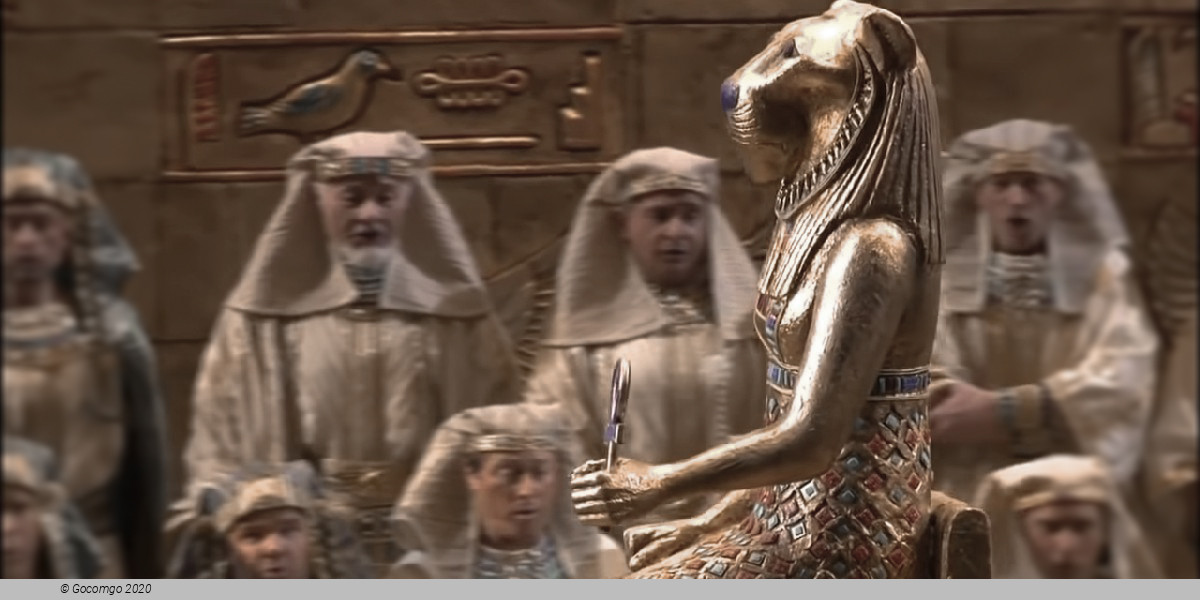




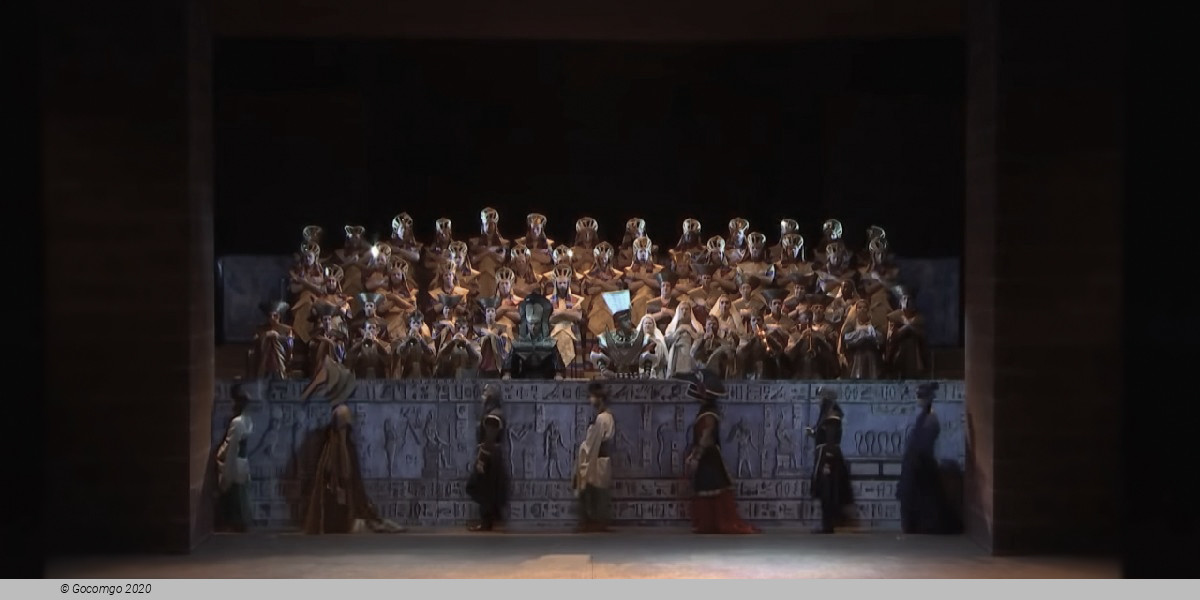
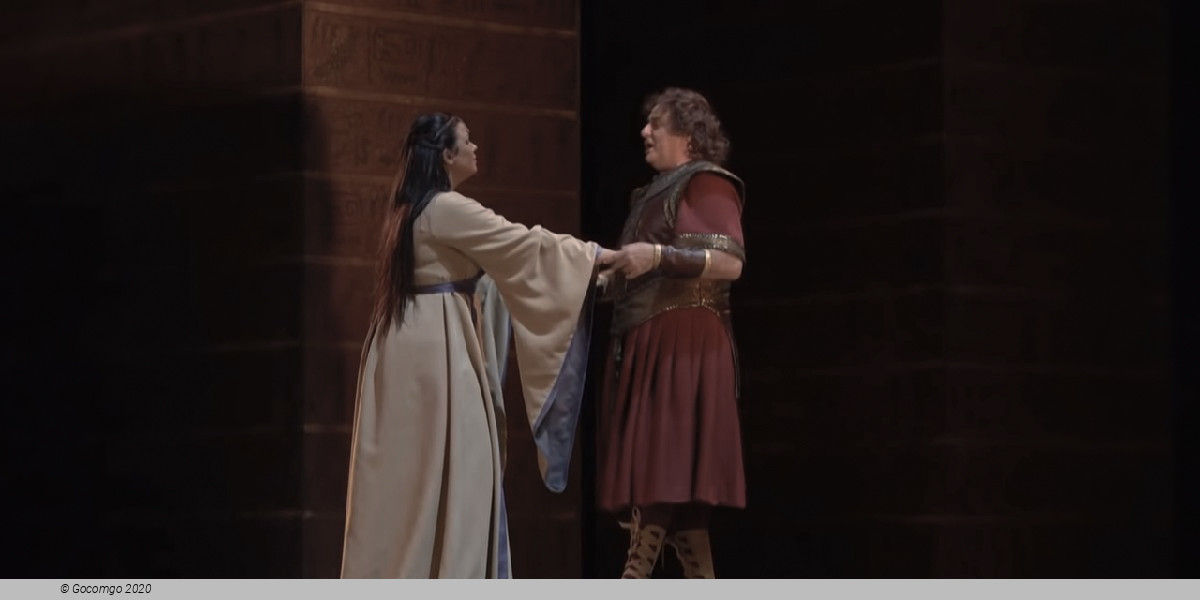
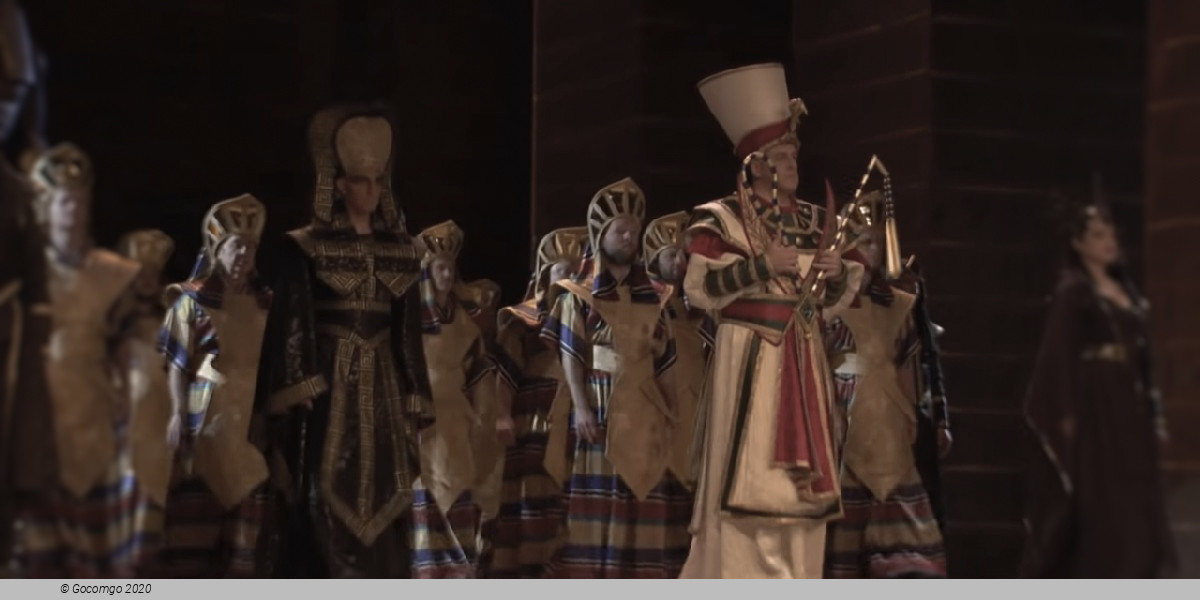
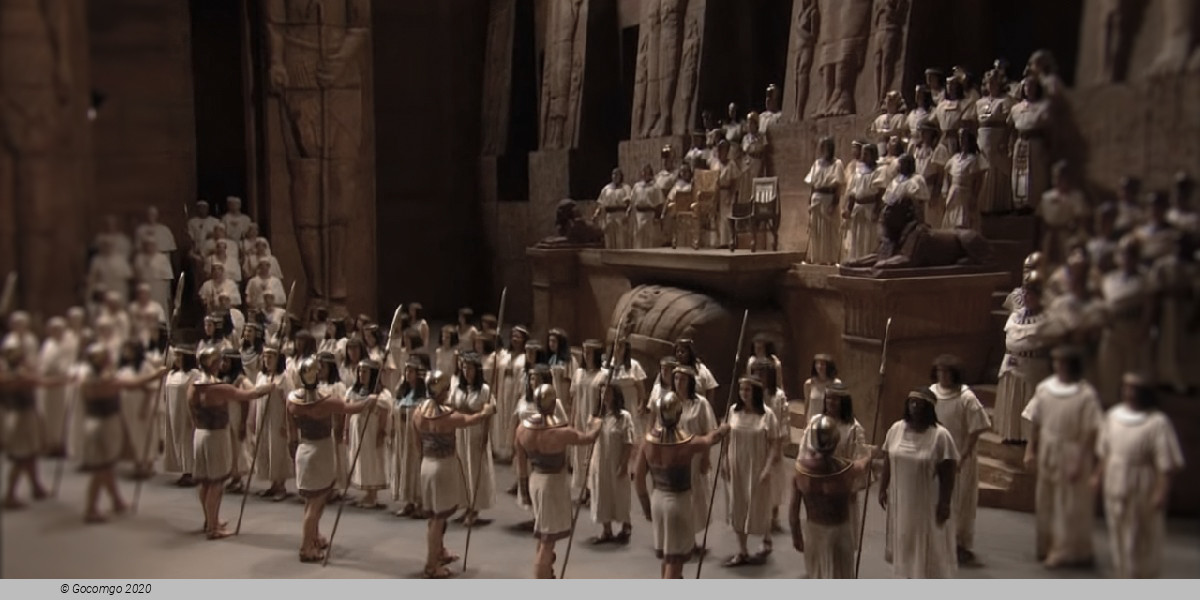
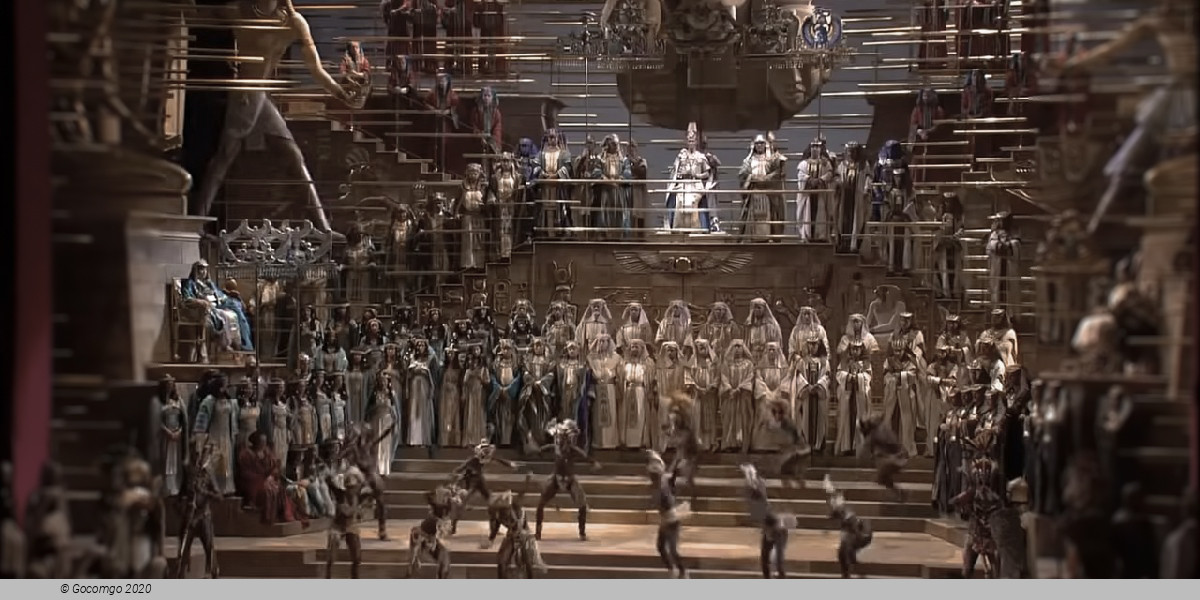
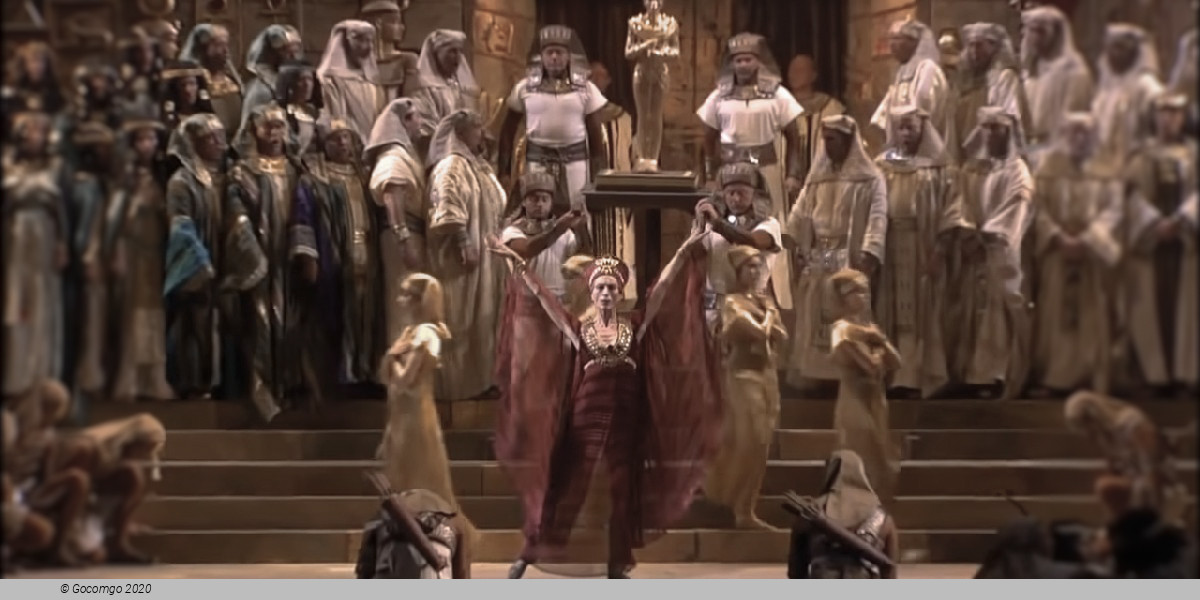
 Piazza Bra, 1
Piazza Bra, 1